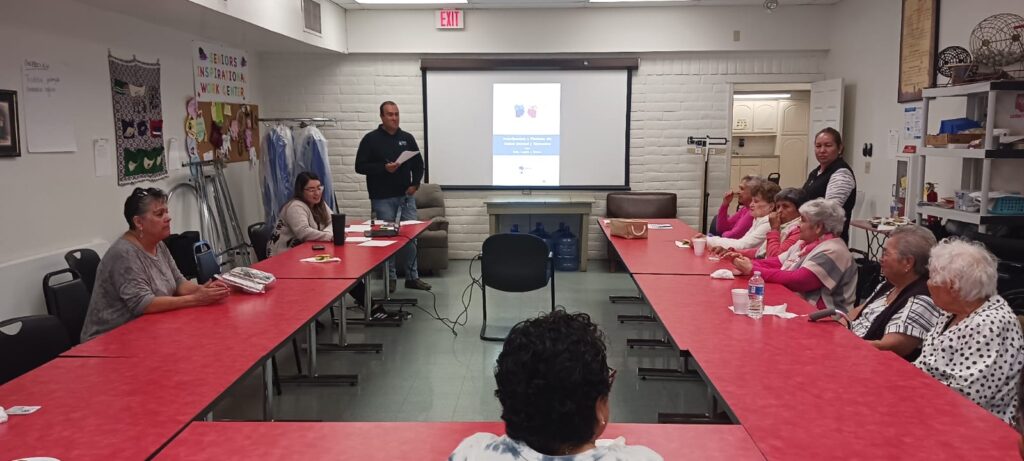On Wednesday mornings at the Nogales Senior Center, many of the elders are now excited to participate in a very unique and lively Wellness program known as “Entre Nosotros/Between Us”. A program designed to be culturally appropriate and linguistically accessible, The Southeast Arizona Health Education Center, SEAHEC, community health workers help elder community members understand how to manage daily experiences, like stress, anxiety, and isolation, and offer coping skills, local resources and referrals for people who need additional services.
SEAHEC, a nonprofit agency dedicated to improving health and well-being in rural border and migrant communities in southern Arizona, is actively engaged in a variety of initiatives aimed at promoting mental health across all age groups.
Lupita Gonzalez, SEAHEC Community Health Worker who co-implements the program explains, “Between Us/Entre Nosotros” addresses the shortage of mental health care professionals serving rural border and migrant Latino/Hispanic communities of southern Arizona, through the utilization and strengthening of our community health worker workforce. We were able to increase skills and knowledge of our CHW workforce to provide mental health education and support in rural border communities of Douglas & Nogales and strengthen mental health support services through referrals and partnership, it has truly been a success!”
In January 2023, SEAHEC received funding from the CIGNA Foundation to address mental health issues among rural, primarily Latino residents in both Nogales and Douglas Arizona. Our staff took a unique approach to designing, piloting, and implementing our own locally appropriate curriculum and approach to discussing and addressing mental and behavioral health issues. With initial surveys in both communities demonstrating that mental health is a priority health concern for both community members and health providers alike, SEAHEC knew we were on to something much needed. At the same time, we understood that we had to take a careful look at stigma and understanding people’s fears about dealing with these sensitive topics.
“Entre Nosotros/Between Us” was launched. In Nogales, we utilized a weekly 1 hour format for 6 weeks, whereas in Douglas we held half day workshops. The curriculum was offered in both English and Spanish. Each course fit the unique needs of each community. Topics covered during the sessions include what is mental health, stress, anxiety, depression, opioids and addressing stigma. After each session CHWs’ provided a local community resource guide and educational material on each topic. A referral system connecting community members to existing services and sending them directly to existing partners for follow-up was developed with partners Mariposa Community Health Center and Pinal Hispanic Council.
These “warm hand off” referrals help reduce the gap between the community needs and existing services by SEAHEC meeting people where they are and helping them navigate our complex healthcare system. Oftentimes, disconnectedness between mental and primary health services is an obstacle for people who need services to seek care. In this coordinated manner, our program helps address these obstacles.
Group discussions are held where seniors share insights on what they have learned. Highlights included stress reduction techniques such as walking in the park, drinking tea to relax, listening to music, playing a musical instrument, singing, and calling a friend or family member if feeling lonely or upset. Seniors mentioned that participating in programs offered at the centers has helped them socially, mentally, and physically.
Testimonial: After the session about anxiety and depression, a senior in her 80s shared the grief she had experienced after losing her son. She lives alone and often has to ask friends or grandkids for rides to run errands. Her “go to” place is the Senior Center. I get sad on weekends because the center is closed” she shares in Spanish, and remarks on how much she enjoys the classes offered, chorus, bingo, and of course, our wellness sessions.
At the end of the first year’s sessions, 100% of the participants were able to identify signs and symptoms of anxiety, stress, and depression. As important, participants improved their knowledge and skills for managing these issues and knowing community resources for receiving additional support.
Recently, SEAHEC has received funding from the National Institutes of Health, a first-of-its-kind community-led research program to study ways to improve access to Mental & Behavioral (M/B) Health services in rural and Latino communities. This new initiative will allow us to keep working with our communities and partner agencies to address this priority health issue, in the long term.
For more information contact Brenda Sanchez, Program Manager, SEAHEC bsanchez@seahec.org
















More Stories
What is a credit score and how is it calculated?
Adopting vegetarian or vegan diets
We all dream of having a pet that is part of our family
April 22, International Mother Earth Day
We have two years to save the planet, warns the UN
The Tucson Roadrunners have announced dates for their 2024 WhiteOut Tour leading up to the Road to the Calder Cup